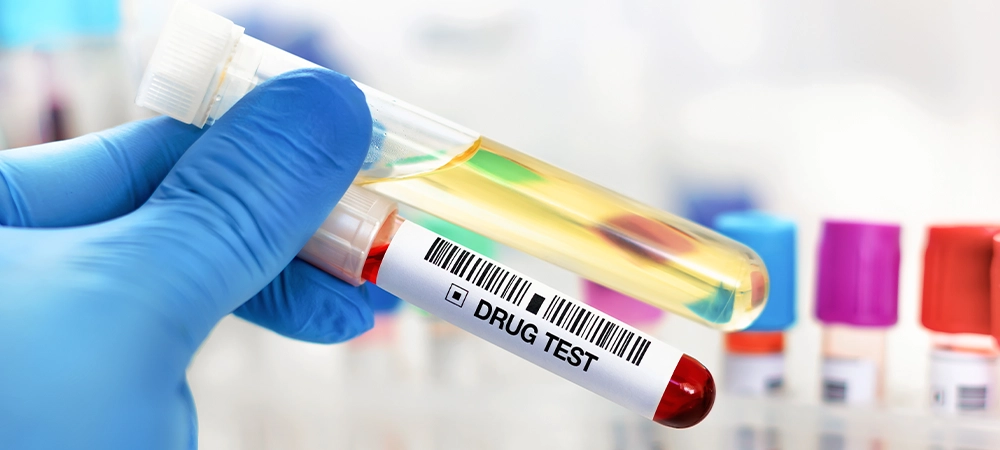Amphetamines are powerful stimulants that affect the central nervous system, often prescribed for conditions like ADHD or narcolepsy. However, they’re also widely misused due to their energy-boosting and euphoric effects. Common forms include prescription drugs like Adderall and illicit substances like methamphetamine.
A common question among those using amphetamines, particularly those considering recovery, is: How long do these substances stay in your system? More specifically, how long are they detectable in your blood?
Understanding this timeframe is crucial for a variety of reasons, ranging from anticipating withdrawal symptoms to passing a drug test. This knowledge is particularly important for individuals seeking help for amphetamine addiction, as it can inform treatment plans and expectations for recovery.
Related Article: What Is Amphetamine?
Factors Affecting Amphetamine Detection Time
There’s no single answer to how long amphetamines linger in the bloodstream. Detection time is highly individualized, and influenced by a complex interplay of factors.
Types of Amphetamine
The specific type of amphetamine used plays a major role in its detection window. Methamphetamine, a potent illicit stimulant, tends to remain detectable for longer periods than prescription amphetamines like Adderall or Vyvanse, due to differences in their chemical structures and how they’re processed by the body.
Amount and Frequency of Use
The more amphetamine consumed and the more frequent the use, the longer they’ll be detectable. Higher doses and chronic use saturate the body, requiring more time for metabolism and excretion. A single, low dose might be undetectable within 24-48 hours, while heavy, prolonged use could extend detection up to 72 hours or more in blood tests.
Individual Metabolism and Body Chemistry
Each person’s unique physiology influences how quickly they break down and eliminate amphetamines. Factors like age, weight, genetics, liver and kidney function, and overall health play a role. For instance, individuals with slower metabolisms or underlying health conditions may process amphetamines more slowly, leading to longer detection times.
Hydration Levels
Staying well-hydrated can aid in the faster elimination of amphetamines through urine. Drinking plenty of water can help flush out the drug metabolites, potentially shortening the detection window. Conversely, dehydration can concentrate amphetamines in the system, prolonging their presence.
Type of Drug Test
The chosen testing method significantly impacts the detection time frame. Blood tests typically detect amphetamines for the shortest duration (up to 48–72 hours), while urine tests can extend to a few days.
Hair follicle tests offer the longest detection window, potentially revealing amphetamine use for several months, as traces of the drug become embedded in the hair as it grows.
Understanding these factors is crucial for anyone concerned about drug testing or managing amphetamine withdrawal. If you have specific questions about your situation, consult with a healthcare professional for personalized guidance.
Average Detection Windows
While individual experiences can vary, here’s a general estimate of how long amphetamines might be detected in blood:
- Single Use: After a single dose of amphetamines, they are typically detectable in the blood for up to 48 hours.
- Chronic Use: For those who use amphetamines regularly, the detection window may extend to up to 72 hours.
Remember that these are just average figures. As mentioned earlier, various factors can influence the actual detection time. This includes the individual’s metabolism, hydration level, and the specific type and amount of amphetamine used.
Therefore, it’s always best to err on the side of caution and assume that amphetamines may be detectable for longer than the average timeframe. If you’re concerned about passing a drug test or are seeking guidance on managing amphetamine withdrawal, consult a healthcare professional for personalized advice.
Why Detection Time Matters
Understanding how long amphetamines remain detectable in your blood has significant implications for both your personal life and your recovery journey.
Implications for Individuals
-
Employment Drug Tests
Many workplaces have strict policies regarding drug use, and amphetamines are often included in standard drug screenings. A positive result can have serious consequences for your career, potentially leading to termination of employment, withdrawal of job offers, or difficulty finding new opportunities.
-
Legal Consequences
Possession or use of illicit amphetamines like methamphetamine is illegal and can lead to criminal charges, fines, or even imprisonment. Even legal prescription amphetamines can be misused, and a positive drug test could be used as evidence of such misuse, resulting in legal repercussions or loss of prescription privileges.
-
Health Monitoring
For individuals prescribed amphetamines for medical conditions like ADHD, understanding detection times is crucial for responsible medication management. Regular drug tests can help monitor medication levels, ensure adherence to prescribed dosages, and detect any potential misuse or diversion of the medication.
It’s essential to maintain open communication with your healthcare provider about your amphetamine use to ensure safe and effective treatment.
Significance for Those Seeking Treatment
- Understanding Withdrawal Timelines: Knowing when amphetamines are out of your system can help you anticipate and manage withdrawal symptoms, which typically peak a few days after the last use.
- Developing Personalized Treatment Plans: Information about amphetamine detection times can assist healthcare professionals in tailoring treatment plans to your specific needs. This might involve medication-assisted treatment, behavioral therapy, or other interventions.
Knowing when you can expect amphetamines to clear your system is an essential part of exploring the path to recovery. It helps you prepare for challenges, set realistic expectations, and make informed decisions about your health and well-being.
Related Article: Exploring Alternative Therapies for Addiction Treatment

Seeking Help for Amphetamine Addiction
Overcoming amphetamine addiction is a challenging journey, but it’s one you don’t have to face alone. Professional guidance and support can make all the difference in achieving lasting recovery.
If you or someone you love is struggling with amphetamine use, consider reaching out to a reputable treatment centre like Addiction Rehab Toronto. We understand the urgency of addiction and offer a rapid admission process, often admitting clients within 24 hours.
Our expert clinical team develops personalized treatment plans that address the unique needs of each individual. We provide a safe and supportive environment where you can focus on healing and rebuilding your life.
A New Beginning: Your Path to Recovery
As we’ve explored, the duration amphetamines remain detectable in your blood can vary considerably depending on individual factors and the type of amphetamine used. While general estimates exist, it’s important to consult with healthcare professionals for personalized guidance, especially if you’re facing drug testing or seeking addiction treatment.
Remember, the presence of amphetamines in your system is not a life sentence. Recovery is possible, and understanding the detection window is just one step in that journey. If you’re struggling with amphetamine addiction, don’t hesitate to reach out for professional help. With the right support, you can overcome this challenge and embrace a healthier life.
Don’t wait to get the help you deserve. Contact Addiction Rehab Toronto today for a confidential assessment and take the first step towards a healthier, happier future.








